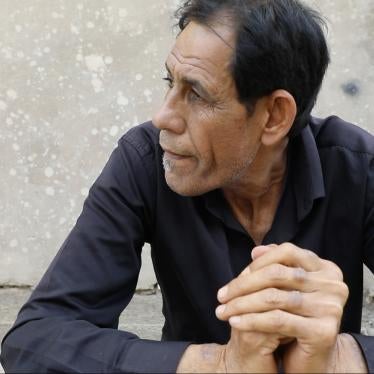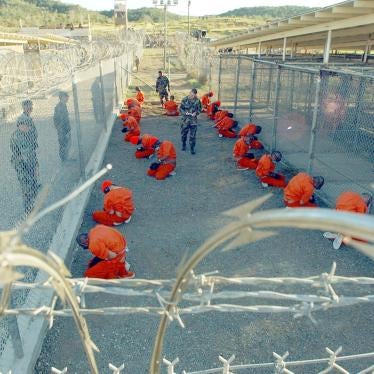Hannah Pakula reviews William Schulz's Tainted Legacy, 9/11 and the Ruin of Human Rights.
The theme, or, as Anthony Lewis puts it in his preface, the "alarming thrust" of William Schulz's Tainted Legacy is the way in which the United States has "backed away" from the principles of human rights at home and abroad since 9/ll. As Schulz informs the reader, the opinions expressed are personal observations and do not reflect policies promulgated by Amnesty International, of which he is Executive Director. Written to convince our policy makers and their advisors that human rights must not be discarded in the process of waging war on terrorism, Tainted Legacy is a timely textbook for this administration (which will ignore it), as well as a report card for members of the human rights community.
According to Schulz, there are demonstrable ties between global violations of human rights and the onset and practice of terrorism. If we define human rights in the broad sense of the word, i.e., the right to bed, board, health care and education, the statistics in the Middle East are devastating: the gross product of all Arab countries together is less than that of Spain; one in five Arabs lives on less than $2.00 a day; in Arab countries, unemployment averages around 20%; for many in Egypt, it reaches 55% and in Saudi Arabia, nearly 60%. Hence a lot of young men out there looking "with sympathy upon political and religious extremists." Sadly, we Americans have only made matters worse: we supported Saddam throughout the 1980s; we have catered to repressive Arab leaders to get fuel for our SUVs; and our politicians have pandered to the Christian Right and Jewish vote by adopting a double standard in the Israeli-Palestine conflict.
But if previous administrations made inadvertent or uninformed mistakes, Schulz explains how the current administration had managed to backtrack to the days before human rights were part of the political vocabulary. To quote Condoleeza Rice during the 2000 presidential campaign: "Foreign policy in a republican administration will proceed from the firm ground of the national interest, not from the interests of an illusory international community." Not only is this administration willing to do whatever it takes to help the rich and powerful at home, it feels justified in ignoring the rights of those outside the circle of the righteous. Virtue, says Schulz, must not be a prerequisite for rights, and he reminds us of that our history started with the Puritans who came to America to find religious freedom—for themselves alone. As the minutes of an early New England town meeting are said to have read; "Voted first that the Earth is the Lord's and the Fullness thereof. Voted second that the Earth is given to the Saints. Voted third that We are the Saints."
This attitude has filtered down to today. In spite of President Roosevelt's insistence that the four freedoms applied to everyone on earth and Eleanor Roosevelt's translation of that concept into the Universal Declaration of Human Rights, there are those who continue to believe that we, because of our special virtues, are exempt from this law. Hence the refusal by the Bush Administration to honor Clinton's signature on the treaty creating the International Criminal Court. Add to this, the current administration's "violation of international standards regarding the treatment of foreign nationals;" its refusal to comply with the Geneva Conventions by labeling prisoners as "unlawful combatants;" and its support of regimes that deny political and religious freedom to their citizens.
The Bush administration has not only used 9/ll to bypass human rights institutions outside the United States, it has exploited this tragedy to institute an unholy watch on its own citizens. The U.S. Patriot Act, a reaction to 9/11, authorizes the FBI to invade the files of libraries and bookstores to determine what books a person has checked out. "Already close to 10 percent of all public libraries, in one survey," according to Schulz, "reported having been approached by federal or local law enforcement seeking such information." The FBI is also permitted to infiltrate services of worship and political groups without a specific reason for doing so.
To his credit, Schulz does not hesitate to deal with the more ambiguous questions permeating the world of human rights. He recognizes the tendency for human rights workers to see only one side of a picture and lists solid criteria for military intervention as a last resort. He poses the inevitable question of the ticking bomb vs. the prisoner who, if subjected to torture, might spill information that would save the lives of innocent bystanders. Although President Bush assured the U.N. High Commissioner for Human Rights that the "U.S. has not and will not use torture interrogating prisoners," there are, according to senior American officials, "acceptable techniques like sleep and light deprivation and the temporary withholding of food, water, access to sunlight, and medical attention." And from another official quoted in the Washington Post: "We don't kick the [expletive] out of them. "We send them to other countries so that they can kick the [expletive] out of them."
Tainted Legacies covers most of the questions surrounding America's position on human rights today. To quote the author: "In its 'anything goes' mentality in the fight against terrorism; its inclination to down play, if not ignore, even the most egregious human rights violations of its allies; its tendency to see terrorists under every turban; its conviction that international covenants mean little and matter less, the Bush administration has done more to damage human rights in its two and a half years in office than the occasional hypocrisy and frequent indifference of nine previous presidents put together. And," he adds, "it has done so largely with the acquiescence of the American people."








